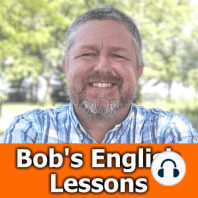4 min listen

Learn the English Phrases GET PAST and GET OVER
Learn the English Phrases GET PAST and GET OVER
ratings:
Length:
4 minutes
Released:
Dec 21, 2020
Format:
Podcast episode
Description
Read along to practice your English and to learn the English phrases GET PAST and GET OVERIn this English lesson, I wanted to help you learn the English phrase get past. In its simplest form, it simply means to get by somebody or to get by something, to get to the other side. Maybe you're at a party and there is a snack table on the far side of the room. You might say to your friend, "I'm going to try and get past these people so that I can get some snacks." The other meaning I wanted to talk to you about, though, is best described by giving you some example sentences. You could say things like this. You could ask a friend, "Did you buy that red car you were looking at?" And your friend could say, "No, I couldn't get past the fact that it gets really bad gas mileage." Your friend could say, "Did you ask that person out on a second date?" And you could say, "No, I couldn't get past the fact that they chew with their mouth open." So I think that helps you understand that phrase.WANT MORE ENGLISH LESSONS? GO TO YOUTUBE AND SEARCH, "BOB THE CANADIAN"#englishlessons #english #englishphrase #speakingenglish #bobthecanadianThe second phrase I wanted to help you learn today is the phrase to get over. So again, two different definitions. If you are sick, you could say that it took you awhile to get over the flu, or it took you awhile to get over your cold. You could also use this, though, to talk about a time in your life that was very, very difficult. You could say, "After I broke up with my girlfriend, it took me a while to get over the breakup. It took me a while to feel normal and happy again." So again, two different definitions.So once again, to get past something can mean to literally try to get by something to get to the other side, or it can mean that it's something you couldn't stop thinking about when you were making a decision. Again, I didn't buy the red car, because I couldn't get past the fact that it gets bad gas mileage. And to get over something can refer to a sickness, like it took me a while to get over the last cold I had. My nose was stuffed up for a long time. Or you could say, "It took me a long time to get over the breakup I had with my boyfriend or girlfriend."Let's look at a comment, though, from a previous video. This comment is from Javier, and it was a great comment. Javier says, "Hey, Bob, don't teach us bad English. You just said in the video, there's too many people there. I'm joking. I know you natives do this every single day, despite people being plural. It's only natural, so it's normal we get used to hearing it. Have a nice day and jolly holidays as well." So interestingly enough, when we say there are, the contraction of there are in informal English speech, it's very informal, is there's. We go back to the singular. I'll give you some examples in a minute. My response was this. "Yes, you are right. In informal English, it is very common to shorten there are to there's. It is technically incorrect, but has definitely moved into everyday speech. I will continue to be natural."So I do try to use as natural English as possible in these lessons, and from time to time, I use very informal English, which is technically incorrect, but is used all the time. Here are some examples with there are.Support the show (https://www.patreon.com/bobthecanadian)
Released:
Dec 21, 2020
Format:
Podcast episode
Titles in the series (100)
Learn the English Phrases SPOILED BRAT and ROTTEN APPLE by Bob's Short English Lessons